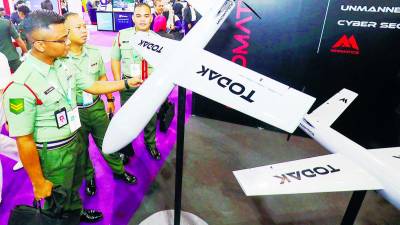KUALA LUMPUR: Deputy Defence Minister Adly Zahari has urged the world to establish binding rules for cyberspace, adding that attacks on civilians and critical infrastructure must be outlawed as nations face increasingly borderless and destructive digital threats.
“Artificial intelligence (AI) is now as critical as electricity or water. If AI fails, is hacked or hijacked, the effects could impact militaries, economies and societies,” he said during his keynote speech at the Cyber Siaga 2025 event yesterday.
He added that AI could be poisoned with false data or manipulated to spread disinformation, raising the risk of leaders making decisions based on compromised systems.
“Machines may accelerate action, but leaders must weigh the consequences in human terms; sovereignty, lives and stability.”
Adly also said Asean could serve as a bridge between regional priorities and global initiatives, ensuring developing nations are not sidelined in shaping cyber norms.
His call was reinforced by experts who warned that Malaysia’s reliance on a defensive cyber posture could leave the nation exposed as adversaries prepare to weaponise digital networks in future conflicts.
Crest Asia Council Malaysia chairman B.K. Soon said Malaysia has no intention of launching offensive cyber operations, choosing only to block intrusions.
“At this point, Malaysia (opts for) defence, not active defence.
“We do not have the intention or the desire to go into other people’s systems.”
He said such restraint could prove costly, as Asean countries must contend with “big boy” powers that dominate the cyber battlefield.
“When we introduce any military asset, the payloads that the bigger country sends us are always different. And the same could happen in cyber warfare and cyber weapons.
“They would not sell us the best tools or the best protection to defend ourselves,” Soon said, urging Asean to take greater responsibility for its digital security.
Australian Defence Force cyber commander Maj-Gen Robert Watson said adversaries are no longer content with low-level hacking or data theft, warning of a shift towards “pre-positioning”, a phenomenon in which hostiles embed themselves in networks ahead of conflict.
“There is only one reason why you would pre-position, which is to bring down systems during conflict at a time and place of your choosing.”
Watson described this as a “dangerous new phase” of cyber conflict, one that may already be in motion despite the absence of open state-on-state cyber warfare.
“At the moment, cyber has not been used in a state-on-state conflict, so we are in the very early days of thinking about the strategy and employment of cyber as a true ‘warfighting’ domain.
“But we must prepare for it, because it would be a key part of any future conflict.”
Meanwhile, Japan Institute for Cyberspace Studies special adviser Harris Hursti flagged the fragility of AI, warning that it could be manipulated with false data or malicious “magic tokens” to trigger harmful behaviours.
“AI could be turned against us. We are carrying time bombs in our models and we have very little we could do to defuse them,” he said, adding that flaws could persist across generations of models, leaving governments, businesses and individuals exposed to manipulation at scale.
Cyber Siaga 2025, held alongside the Cyber and Digital Services, Defence and Security Asia Exhibition and Conference at the Malaysia International Trade and Exhibition Centre, brought together senior defence leaders, industry specialists and regional partners to confront the escalating threats of the digital era.
